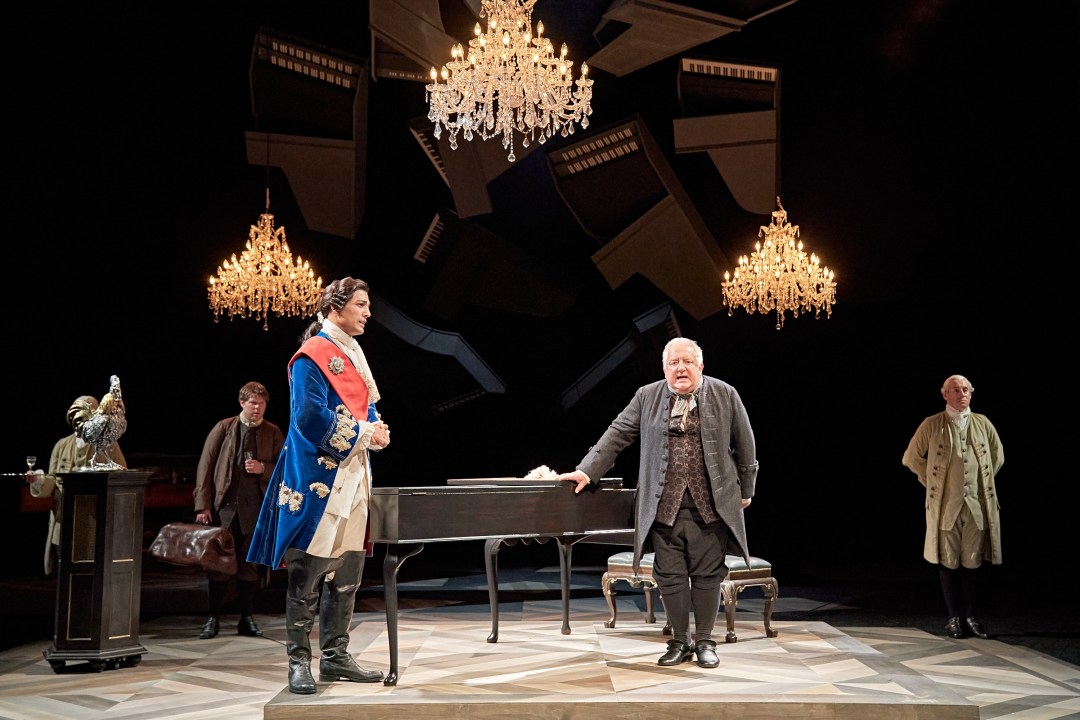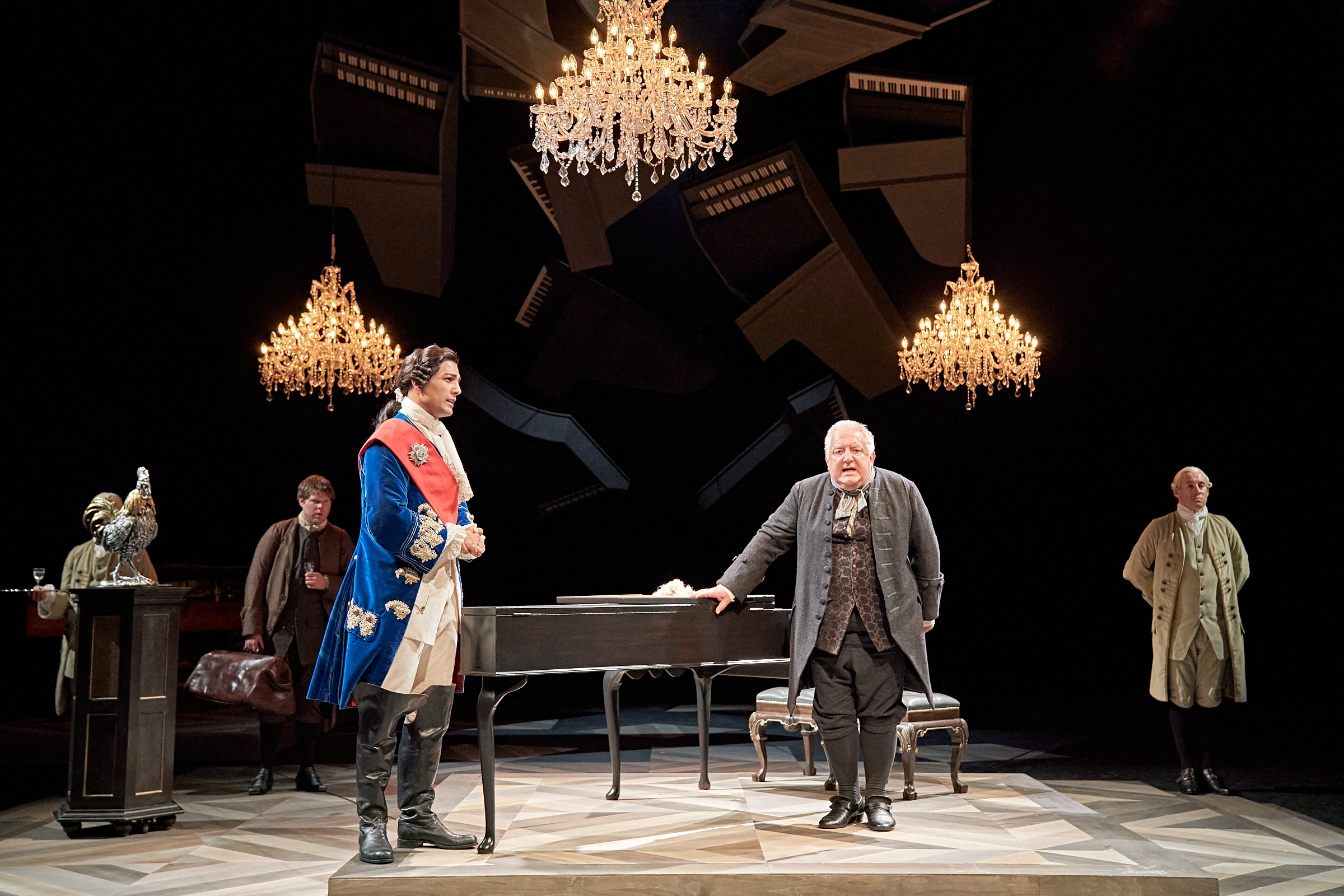Bach & Sons opens with the great composer tinkling away on a harpsichord while a toddler screeches his head off in the nursery. The script becomes a broader portrait of a richly creative and competitive family where everyone is bright, loud, witty, inventive, good-natured and affectionate. Bach teaches the elements of composition to his gifted sons. ‘Rules provoke expression. They challenge your ingenuity.’ And the audience is unobtrusively schooled in the elements of counterpoint by four actors singing ‘Frère Jacques’. Bach considers Carl’s work good but workmanlike. Wilhelm is better, a wayward, inspired and anarchic talent. When Carl hears this verdict he falls into a jealous rage but it doesn’t last. The boys remain friends and they like to joke about their workaholic dad. ‘He writes a lot of stuff about death in G major.’
The second act opens in a new era, the age of reason. Powdered wigs and embroidered long-coats are the style. Bach has moved to Leipzig and remarried after his wife’s death. The talented Wilhelm has turned into a hopeless drunk while Carl, the plodder, is making a fortune composing music at the court of Frederick the Great. This is a terrific play about families and ambition. It’s also a fascinating lesson in history, musicology and religion. More than that, it’s a dissertation on creativity. Bach sees himself as a simple tradesman who exchanges his skills and expertise for cash. He doesn’t pose as a ‘tortured genius’ because he toils in the service of God rather than his ego.
Bach sees himself as a simple tradesman who exchanges his skills and expertise for cash
Simon Russell Beale seems personally similar to his subject — modest, friendly, sensitive, blazingly intelligent but good enough to keep that to himself. He plays the role with an engaging, cynical ordinariness. He could be Bach. He could be a London cabbie. He’s supported by Pandora Colin as the sweet-natured Maria Barbara. Douggie McMeekin stands out as Wilhelm, the giggling oafish sot. And Pravessh Rana’s intriguing performance captures the physical clumsiness and the charismatic oddity of Frederick the Great.
At one point Bach makes a throwaway comment about the creative process. ‘Start with a doodle and end with something mighty.’ That could apply to any number of masterpieces, from the Pyramids to ‘Hey Jude’. This play is a wonder. It feels like a century of wisdom and experience crammed into two brief hours. New York will love it. Surely, the transfer is already booked.
Maggie & Ted is a documentary about Thatcher and Heath that emphasises their similarities. Both were provincial outsiders who got into Oxford, where they changed their accents, and both reached the top of politics. Ted received constant praise from his doting mother. ‘I’m clearly destined to become a great man,’ he announced as a schoolboy. He was friends with Thatcher in the early years and he delivered a speech for her at Dartford where she stood unsuccessfully in the 1950 election. Michael McManus’s script is full of telling details. While Thatcher was searching for a safe seat, she worked as a chemist on the team that developed soft-scoop ice cream. Denis was asked who wears the trousers in his relationship. ‘I do. And I wash and iron them as well.’
Heath rose through the whips’ office and became the first Tory leader to be elected by the parliamentary party. Power seems to have neutered his abilities. In 1975, despite losing two elections in the previous year, he still clung to the leadership. His colleagues in the shadow cabinet felt it would be bad form to challenge him. Mrs Thatcher had no such qualms. She struck and triumphed.
And so their long feud began. Thatcher offered a few gestures of reconciliation but Heath wasn’t interested. He even resisted the well-intentioned attempts to dislodge him from the Commons. Ambassadorships and other grand jobs overseas were offered and rejected. He withdrew into himself and turned his intelligence into a weapon rather than an instrument of self-help. At a public dinner, a woman asked him: ‘Isn’t this funny weather we’re having?’ and he said: ‘I don’t find it amusing.’ In later years, he was spotted in pubs with no one to talk to but his bodyguards.
Thatcher meanwhile went from victory to victory. She defeated the miners, General Galtieri, and three Labour leaders in a row. But her deadliest enemies were in her own party. When she was toppled in 1990 she seemed to be the last person in the country to realise it was inevitable. The atmosphere during this play is strange, crackling, feverish, hard to predict. It’s more like a public hustings than a rehearsed event. The audience whoop with delight when Thatcher speaks up defiantly for women. Or they groan in dismay when Heath drops another clanger. The short run at the Garrick has ended but it may be revived. A national tour seems inevitable.








Comments